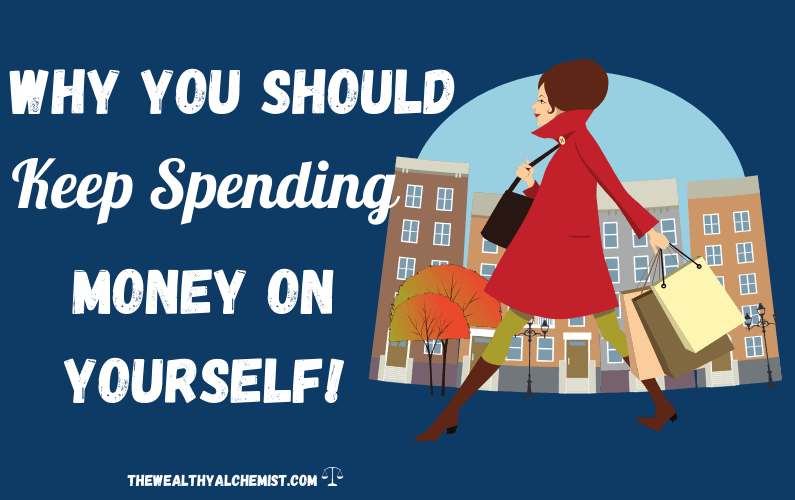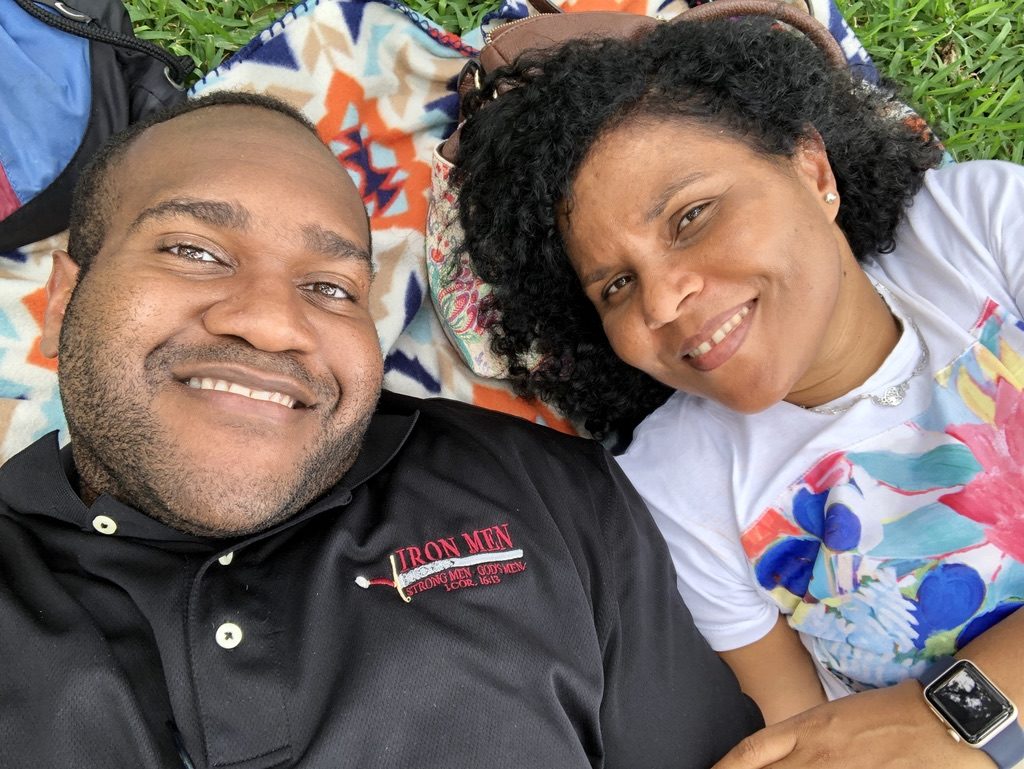
Not spending money on yourself will keep you broke…
Yep, you read that right!
Now, if you’re up to your eyeballs in debt, you might say that you can’t afford to spend anything on “non-essentials” (By non-essentials, I just mean the things you know you don’t need). But I’m here to tell you that spending money on yourself is a must have category in your budget.
Because without the occasional treat, you’re much more likely to blow your budget in spectacular fashion.
Contents
Not Spending Money on Yourself Can do More Damage to Your Finances
Think about it like this. Have you ever tried to lose weight? To arrive at your goal weight, you probably created a diet for yourself. You counted calories, avoided sugars and carbs. You even passed up free cookies and cake at your office.
Perhaps you were able to keep that routine up for a few days. Heck, maybe even a few weeks.
But eventually, you broke. And you broke in spectacular fashion. You went from sugar-free, low carb, low-fat, low-calorie foods to donuts and pizza and Häagen-Dazs all in one day.
And the result of that weeklong deprivation diet? You actually gained 3 pounds!! WTF!
No shame, no shame. After all, you’re human, and it’s only natural to crave that sweet, salty, fatty goodness.
Well, controlling your spending is kind of the same deal.
We write out our plans to pay down debt. We go crazy about saving money and start to make extreme choices to reduce our expenses.
But What End up Happening?
We do well, for a while, but that feeling of deprivation eventually causes us to break down and spend a lot more in the end.
Soooo, if we’re trying to dig our way out of debt or build respectable savings the answer is…not to eliminate non-essential spending??
But you obviously don’t want to let your non-essential spending run wild either. In that case, what should we do?
Balance is the key
The point of budgeting and limiting your non-essentials isn’t to deprive yourself (which is how many of us usually feel while budgeting). It’s simple to control our cash flow. And in my experience, the best way to control it is by being balanced.
The way I usually think of it is like a pendulum. If you swing too far in the direction of luxury and overspending, you’re eventually going to end up swinging back into financial hardship.
In fact, this trend was mentioned here where a majority of millennials are holding off on major life events because they’re in so much debt.
On the other hand, if you swing too far in the direction of deprivation and underspending, your human nature is going to push you to overspend at some point. Just think of your last diet…
The key is to remain balanced. Cut back on your spending without depriving yourself and learn how to buy things you want without going overboard.
Related Post: Prevent Money Fights in Your Relationship.
But How to Get in Balance?
But how exactly are we supposed to do that? The question I always wondered is, “am I really deprived, or am I just greedy and hard to satisfy”?
What do I mean? Well, think about it like this: if you’re struggling with weight loss, how do you know when you’ve had enough to eat?
How do you know if you have not eaten enough and are deprived, or if you have had enough and only feel deprived because of your excess appetite??
Well, that’s a hard one, isn’t it? (Let me continue on with the metaphor for a bit and see if we can find an answer. 🙂
I think the key here is in what we’re eating. It’s easy to overeat sweet, salty, fatty goodness (high-calorie junk food that has little nutritional value). And it’s harder to overeat vegetables (low-calorie real food that had tons of nutritional value).
One way to find out if you’re really deprived or just have an excess appetite is to limit (or eliminate) low-value foods while increasing high-value foods to your heart’s content.
Ok, that’s the end of the metaphor. Thanks for hanging in there. Now, let’s bring it back to finances.
If your budget makes you feel deprived, add things to it that are highly valuable for you. Maybe it’s your favorite subscription service, or the occasional coffee in your favorite café, or just going to the park to see the sunset.
And at the same time eliminate the things that don’t have much value for you.
One way to do this is to look through your bank statement or your spending history in Personal Capital. If you see you spent money on something that you completely forgot about or regret, then chances are it wasn’t valuable.
Eliminate those things from your future spending.

Related Post: Dave Ramsey’s Baby Steps to Financial Freedom.
Spend Intentionally on Value
We recommend that you focus your non-essential spending on things that provide you with the most value.
You know…the things you care about.
And cut out the things that don’t add value to your life.
For example, we get a lot of value out of our Hulu and Wall Street Journal subscriptions. With only those two things we get countless hours of enjoyment and don’t feel deprived if we can’t buy anything else.
Another tactic is to decide on something big you want and save up for it. Like going on a vacation, or going to a ball game in another city.
By saving your money for these big-ticket items, you’ll feel that you’re depriving yourself back today in order to get something big in return tomorrow.
Below, there are a few ideas on spending that may bring value.
Related Post: Amazing Father’s Day Gift Ideas.
1) Spend on Experiences With Your Loved Ones
Once you’ve reached a certain level of material comfort, you won’t get as much value out of continuing to buy things. Instead, you’ll get more bang for your buck when you by experiences.
This happens because once your basic needs are taken care of, more things don’t give you much added value. Sure, a new device may be cool, but the novelty quickly fades, and a newer model is always on the horizon.
Experiences, on the other hand, are more likely to build relationships. And this makes it more likely that you’ll find experiences more meaningful and enjoyable.
This could be going to a ball game, theme park, or even taking a city tour with your friends or family.

Oliver & Idalmis
2) Spend Money to Get More Free Time
Do you ever feel like you don’t have enough time? You’re either stuck in traffic, stuck in an office, or stuck in traffic again. And when the weekend does arrive, you have to clean and shop and fix things.
There’s precious little time for you to do the things you want, and that can be extremely frustrating. One thing you can do about it is to spend money on things that free up your time.
TaskRabbit is an app that puts you in touch with someone that will clean, install, pack, move or perform home repairs for you.
There are also apps like PostMates and DoorDash for those of us that hate grocery shopping or picking up food. With PostMates you can have someone pick up your groceries and actually bring them to your house! And DoorDash is fast food delivery at its finest for those days when you don’t feel like cooking.
With apps like these, you’ll not only have help when you need it, but you’ll have more time to do the things that are valuable for you.
Related Post: How to Smash Obstacles and reach Financial Goals.
3) Pay For Your Peace of Mind
Nearly 80% of American workers live paycheck to paycheck. And around 20% have nothing saved for retirement.
That translates to a lot of stressed people out there. If you’re in that camp you should consider paying yourself first to build your savings and end the paycheck to paycheck cycle.
You may also want to start paying into a retirement account; whether it’s a 401(k) plan, Roth IRA, or whether you’re investing in the market yourself.
If you’re looking to get your feet wet in the market Acorns is an excellent choice. Acorns is an app that rounds up your debit card purchases to the nearest dollar and invests the change into the market for you.
You’re not going to get rich doing it, but it’s a great choice if you just want to get started.
4) Spend Money on Your Skills And Knowledge
Spending money on yourself, specifically in your skills, is another great way to get more value out of your spending.
Investing money in new hobbies will bring you a lifetime of enjoyment. And developing your skills can get you that raise or promotion you want.
One of the best ways to do that is with an app called Skillshare. Skillshare gives you access to over 25,000 classes on everything from photography to investing. And it’ll cost you less than what most people spend on coffee in a week.
If you find value in learning and growing your skills then you definitely ought to check out Skillshare. Sign up here!
5) Spend Money on Giving

Instead of spending money on yourself, there’s also value in spending money on others. Giving to charities is not only valuable for your community but it makes you feel good as well.
You can use Charity Navigator to evaluate all of your favorite charities to help you decide which you’d like to donate to.
Final Thoughts
Remember, it’s a good idea to keep spending money on yourself, but not too much. ![]()
Keeping your spending in balance is the key to prevent yourself from feeling deprived or overspending on things that don’t provide value.
Cheers!

Idalmis
Latest posts by Idalmis (see all)
- Why Is Budgeting Important? 12 Best Reasons to Start Budgeting Today! - October 6, 2020
- How to be Frugal With Groceries. Must Try Tips! - September 15, 2020
- Is Skillshare Worth It? Best 2020 Review - August 31, 2020


